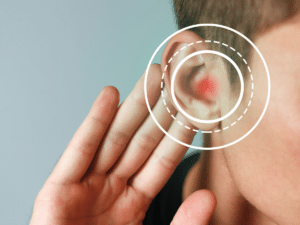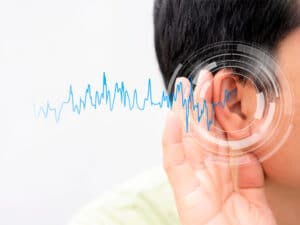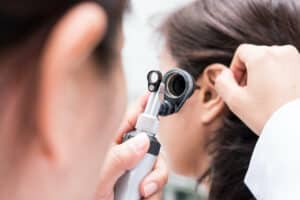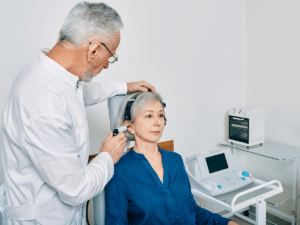If your hearing starts to deteriorate, then it’s natural to assume the worst. You fear that this is the end of your ability to hear and that you’ll end up going deaf.
What many people don’t understand is that you can be hard of hearing and experience hearing loss without going deaf. Deafness is a severe hearing loss that means you’ve almost completely lost your hearing ability. This begs the question; how do you know if you’re just hard of hearing or going deaf? Or What are some signs of hearing loss?
What are some signs of hearing loss?
Hearing loss can manifest in various ways, and recognizing the signs can help you address the issue promptly. Some common signs include:
- Difficulty understanding speech, especially in noisy environments.
- Frequently asking others to repeat themselves or speak louder.
- Turning up the volume on electronic devices, such as the television or radio, to levels others find too loud.
- Struggling to hear high-pitched sounds or consonants.
- Feeling exhausted or stressed from straining to hear conversations.
- Withdrawing from social situations due to communication difficulties.
Ultimately, there are a few signs and things to do that will help you distinguish between the two problems.
GET A HEARING TEST
First and foremost, see your audiologist for a full-scale hearing examination. This is the most effective way of diagnosing your hearing loss. The test will give accurate readings of your ability to hear different sounds at different volumes and pitches, along with how well you understand speech.
Speech is one of the key things here, as deaf people really struggle to understand speech, no matter how high the volume is. Your test results will give the audiologist an idea of what you’re dealing with. They may find that you have minor hearing loss, or you may be further along the scale and be close to deafness.
The beauty of a hearing examination is that it also lets the audiologist determine where the hearing loss comes from. In some cases, it could be a temporary issue brought on by impacted earwax or damage to your eardrum. As such, you can restore your hearing by dealing with these issues.
TRY USING HEARING AIDS
Typically, people with hearing loss will use hearing aids as an attempt to treat the problem. This is proven to be highly effective as the hearing aids essentially restore your ability to hear properly.
These devices will work for you if you’re hard of hearing and have mild hearing loss. You will see dramatic improvements in your hearing abilities when you wear hearing aids. Now, you can hear everything everyone says without needing them to repeat what they’re saying. It will feel like the volume has been turned up, and you can comfortably go about as usual.
If you’re going deaf, then hearing aids aren’t going to work on you. They may provide some added amplification, but it’s not enough to help you hear at a reasonable level. Everything seems quiet, and you still struggle to understand what people say. This is because deafness is such an extreme level of hearing loss that the sensory cells in your ear are almost completely damaged. Sadly, no hearing aids will be able to restore your hearing to a level that you’re comfortable with.
KEEP GOING BACK FOR HEARING TESTS EVERY YEAR
As well as having the initial hearing test, you must keep going back every year at the very least. This is essential for tracking if you have moderate hearing loss or are going deaf.
You see, regular hearing tests will show the progression of any hearing loss. If yours stays the same after a few years, you won’t be deaf. But, if you see dramatic deterioration in the results, you could go deaf.
What is the difference between being hard of hearing and going deaf?
If you follow the three steps above, then it should help you determine if you’re hard of hearing or deaf. Most individuals struggle to distinguish between these terms, but that’s usually because deafness is thrown around a lot in modern society.
When someone starts experiencing hearing loss, they may say they’re going deaf. In reality, deafness is almost a separate condition on its own. Being deaf means you can’t hear much, and nothing will treat the problem. So, you rely on sign language and lip-reading to communicate with others. Your speech will also get worse as you can’t hear what you’re saying. Hearing aids won’t provide any relief, and there’s sadly no cure.
Experiencing hearing loss means your hearing isn’t as good as it used to be. You can have hearing loss and not be deaf. As such, treatments can be used to deal with the situation and improve your hearing – such as hearing aids.

CONTACT US TO LEARN MORE
If you’re concerned about potential hearing loss or fear you may be experiencing deafness, Listen Hear Diagnostics offers comprehensive hearing examinations to provide clarity and diagnosis. Our experienced team is dedicated to guiding you through your hearing health journey.
Feel free to contact us at 914-902-8845 to learn more about our services and receive personalized advice on managing hearing loss or deafness. Don’t hesitate to contact us with any further questions or concerns. We’re here to support you every step of the way.
FAQs
Q: What are some signs of hearing loss at 13?
A: Signs of hearing loss at 13 can include difficulty understanding speech, asking for repetition often, struggling in noisy environments, turning up the volume excessively, speech and language delays, and showing signs of frustration or withdrawal. If you notice these signs, scheduling a hearing evaluation with an audiologist is crucial.
Q: What causes hearing loss?
A: Hearing loss can result from various factors, including aging, exposure to loud noise, genetic predisposition, ear infections, certain medications, and underlying health conditions.
Q: Can hearing loss be reversed?
A: In some cases, hearing loss can be improved or managed with medical interventions, such as hearing aids, cochlear implants, or surgical procedures. However, the effectiveness of treatment depends on the cause and severity of the hearing loss.
Q: Are there lifestyle changes that can help prevent hearing loss?
A: Yes, adopting healthy habits such as wearing ear protection in noisy environments, limiting exposure to loud noises, avoiding using cotton swabs or other objects to clean the ears, and scheduling regular hearing screenings can help prevent or minimize hearing loss.
Q: How often should I have my hearing tested?
A: It’s recommended to have a hearing test at least once a year, especially if you’re over 50 or have concerns about your hearing. Regular screenings can detect changes in your hearing and allow for timely intervention.
Q: Is hearing loss a normal part of aging?
A: While some degree of age-related hearing loss, known as presbycusis, is common as people age, it’s not inevitable. Taking proactive steps to protect your hearing and seeking prompt treatment for any changes in your hearing can help preserve your auditory health as you age.
Q: Is sudden hearing loss a sign of a stroke?
A: While sudden hearing loss can be alarming, it is not typically a direct sign of a stroke. However, in rare cases, sudden hearing loss could be a symptom of a stroke or other serious medical condition. Seek immediate medical attention if you experience sudden hearing loss and other symptoms such as dizziness, numbness, or difficulty speaking.








